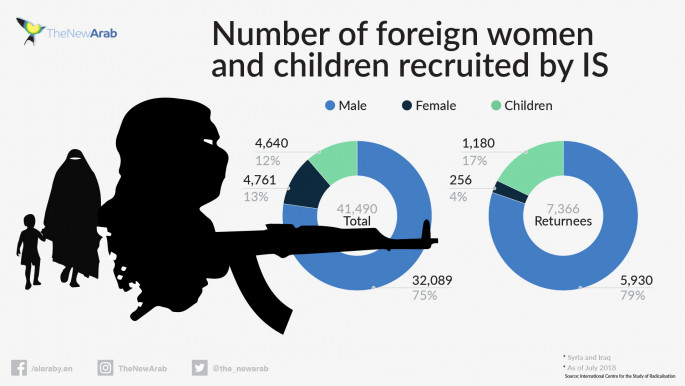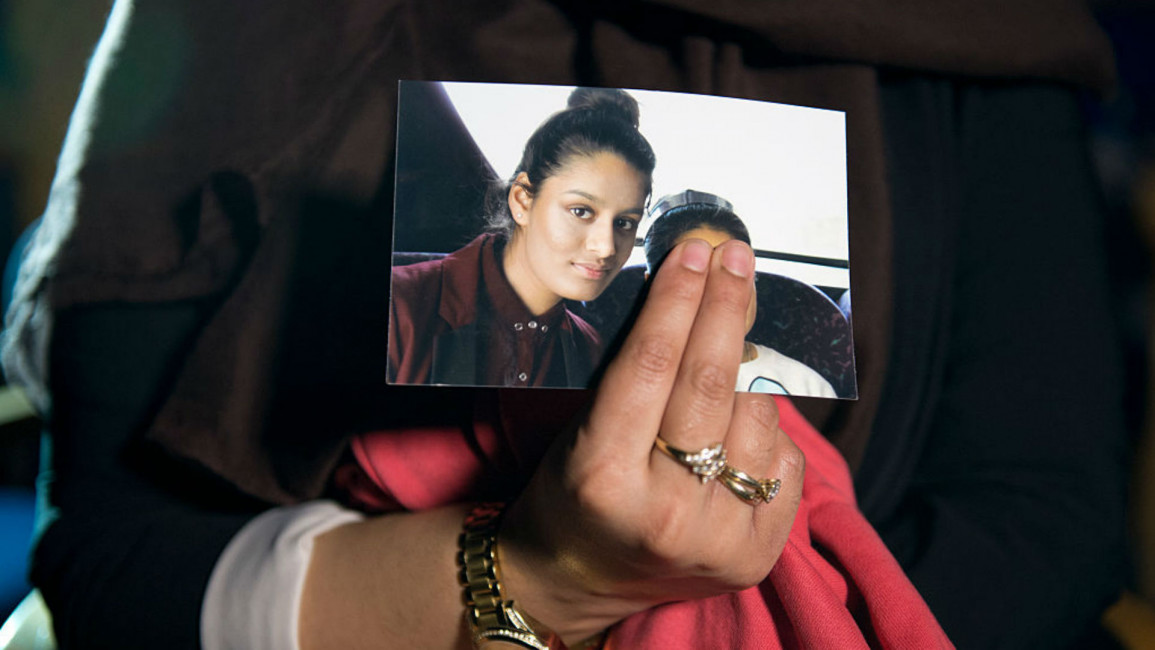
Citizenship is a basic right, even for Shamima Begum
Despite Home secretary Sajid Javid revoking her British citizenship, a discussion on whether she and her new born child are deserving of this, continues.
Most disturbing about the entire affair, is how easily the dehumanisation of Muslims, and the stripping of basic rights such as citizenship which follow, is accepted and proudly practiced under the banner of 'fighting terrorism'. In that vein, the justification of draconian practices is not only supported, but championed. All in the name of supposedly keeping us safe.
Absent from public discourse, is the instability and precariousness of this 'us', of the 'British people' whose interests are supposedly served by the Home office's ability to take the law in their own hands.
The 'collective' needing protection is an imagined privileged inner circle, formed and defined by the British state. Your position within it is dependent on the political agendas of those in power who will happily throw you out if you've stepped out of line in any way, despite the obvious contraventions of human rights and the rule of law.
To many of the global south diaspora communities across the UK, the message was both familiar and clear: Our incorporation within the structures of the British state is always conditional.
 |
Begum, at the very young age of 19, has already been a child bride, buried two of her children, faced starvation and lived in a war zone |  |
And this has been reflected in the nature of the debate. It is not about whether Begum should be judged, punished, helped, provided with therapy, or what should happen to help her young son. Insread, it's about the basis on which she can be stripped of her nationality, and rejected by the only country that has ever been hers.
Once the principle is normalised, it becomes a matter of where the line is drawn, re-drawn, and re-drawn again in the months and years to come, for the rest of us.
Hannah Arendt has beautifully summed up the significance of being rendered stateless, in The Origins of Totalitarianism,
"The fundamental deprivation of human rights is manifested first and above all in the deprivation of a place in the world which makes opinions significant and actions effective.
Read more: Bangladesh says 'non-citizen' Shamima Begum is UK's problem, won't let her in
"Something much more fundamental than freedom and justice, which are rights of citizens, is at stake when belonging to the community into which one is born is no longer a matter of course and not belonging no longer a matter of choice."
In addition to how easily it is becoming to strip certain populations of nationality - a practice that is increasingly applied elsewhere in Europe, especially in France - it is equally striking that the British state continues to function on the precedent that it is superior enough to dump the responsibility of what it considers to be a dangerous individual, onto other nations whose lives it clearly deems of less worth.
 |
|
It was Britain and its society that made Begum; Britain that schooled her; Britain that rejected her so much - implicitly and explicitly - that joining IS seemed more appealing than staying home. Yet, it is the people of Syria, IS' main victims, who are expected to deal with the consequences of the UK's institutional failures.
The dehuminisation of Shamima Begum also points to an issue far greater than the individual case of this 19-year-old who left the UK as a 15-year-old child, after being brainwashed by IS propaganda.
It's about the refusal to accept that she was in fact a child who was manipulated, groomed, and who probably faced considerable psychological health issues.
 |
The Begum case is a terrible yet illuminating case study of British society |  |
We must consider her case in light of these facts, not in order to justify her actions, but rather to understand that using citizenship revocation practices - just another form of state repression - is neither going to show her the error of her ways, nor stop the cycle of others doing the same. In fact, the opposite is much more likely.
It says a lot about Javid, that he opted for cheap political short-term gains over the obvious political responsibility staring him in the face.
Begum, at the very young age of 19, has already been a child bride, buried two of her children, faced starvation, and lived in a war zone where she witnessed barbaric killings and airstrikes.
Twitter Post
|
This is not to suggest we should have any sympathy towards Begum, but to say we should act on the case of a young British woman who internalised violent ideologies, fled her home and now finds herself with her baby in such a desperate situation, through the guidance of experts and specialists.
Instead, we've witnessed a disturbing desire by the media to put her on trial via her interviews in a refugee camp in northern Syria. One such interview by Sky News, shows her being questioned following the birth of her third child, visibly exhausted, and unquestionably hardened by everything she's lived through.
In addition, rarely mentioned in the Begum debate, are the past failures of British institutions to act on intelligence that was collected before begum left for Syria via Istanbul.
The Begum family lawyer Tasnime Akunjee has criticised the fact that counter-terrorism services had mishandled the case of the Bethnal Green schoolgirls, that also saw Kadiza Sultana and Amira Abase leave for Syria.
The girls were even interviewed by counter-terrorism police after one of their friends - Sharmeena Begum - had already left to join IS in 2014.
The parents were not notified of this questioning. Once there were further grounds to worry over the girls' safety, letters were given to the families of Sultana, Begum and Abase, but they were handed to the girls, rather than their parents. The letters were discovered only once the girls had already left.
In addition to the failings of the Met Police, the school had not informed the parents about the events as they unravelled, and Tower Hamlets Council did not carry out a case review upon the girls' departure.
Akunjee stated that, "It is almost inconceivable that to date no agency has been investigated, let alone held to account for the litany of failures that resulted in the Bethnal Green schoolgirls managing to travel to IS."
For all its talk of 'preventing' radicalisation and terrorism, each high-profile case, from Mohammad Emwazi and Salman Ramadan Abedi to Begum and her friends, highlights the utter failures of the system, the previous knowledge of the state, and the inefficiency of the existing so-called safeguarding infrastructure.
 |
Using citizenship revocation practices is neither going to show her the error of her ways, nor stop the cycle of others doing the same. |  |
The system is not designed to understand, intervene, or care for those vulnerable to recruitment by such groups. Instead it is designed to repress political protest, stifle debate and roll back civil liberties.
In this sense, the Begum case is a terrible yet illuminating case study of a British society prepared to strip its citizens of their rights, and one that expects global south countries to deal with the consequences of its own actions.
This is a society that has no interest in caring and helping the most vulnerable in its society before it is too late, and is so focussed on repression and silencing that it repeatedly puts its own citizens and others in harm's way.
The violence of borders, the so-called war-on-terror, and nationalism are at the heart of our current political moment. Begum is a victim of all three. Our response will define who we become in the years ahead.
Malia Bouattia is an activist, a former president of the National Union of Students, and co-founder of the Students not Suspects/Educators not Informants Network.
Follow her on Twitter: @MaliaBouattia
Opinions expressed in this article remain those of the author and do not necessarily represent those of The New Arab, its editorial board or staff.




